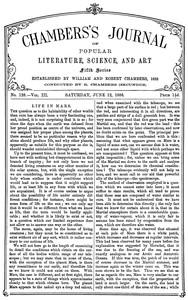Read this ebook for free! No credit card needed, absolutely nothing to pay.
Words: 20683 in 6 pages
This is an ebook sharing website. You can read the uploaded ebooks for free here. No credit cards needed, nothing to pay. If you want to own a digital copy of the ebook, or want to read offline with your favorite ebook-reader, then you can choose to buy and download the ebook.


: Chambers's Journal of Popular Literature Science and Art fifth series no. 128 vol. III June 12 1886 by Various - Periodicals
Release date: August 22, 2023
Original publication: Edinburgh: William and Robert Chambers, 1853
LIFE IN MARS.
The question as to the habitability of other worlds than ours has always been a very fascinating one, and, indeed, it is not surprising that it is so; for since the days when the earth was debased from her proud position as centre of the universe, and was assigned her proper place among the planets, there seemed to be no particular reason why she alone should produce life, and why other planets, apparently as suitable for this purpose as she is, should wander uninhabited through space.
Up to the present time, it must be confessed, we have met with nothing but disappointment in this branch of inquiry; for not only have we not detected living creatures on any other member of the solar system, but, with the single exception we are considering, there is apparently no other body whose surface is under conditions which would lead us to suppose that it might support life, or at least life in any form with which we are acquainted. It is of course useless to argue about the possibility of life under entirely different conditions; for instance, there might be some form of life on the sun; we can only say that it would be so different from what we know as life, that the term would be hardly applicable; and whether it is likely to exist or not, is a question which our limited experience does not allow us to answer one way or the other.
The moon, again, may be the home of living creatures; but they must be so constituted as to exist without air of any sort, which is rather contrary to our notions of life.
We will not here go to the length of examining in detail the conditions which obtain on the surface of all the bodies within range of our telescopes; but we may state that in none of them, with the exception of the planet Mars, is there any resemblance to our earth, and therefore life as we know it could not exist on them. With Mars, the case is different, and at first sight, there appears to be a state of things which approximates closely to that which obtains here. The planet Mars appears to the naked eye a deep red colour, and when examined with the telescope, we see that a large part of his surface is red; but between the red, and intersecting it in all directions, are patches and strips of a dull greenish hue. It was very soon conjectured that this green part was the Martial sea, and that the red was the land: this has been confirmed by later observations, and now no doubt exists on the point. The principal problem that we are here confronted with is this: assuming that what appears green on Mars is a liquid of some sort, can we assume that it is water, and not some other liquid with which perhaps we are unacquainted? This question appears at first sight impossible; for, unless we can bring some of the Martial sea down to the earth and analyse it, how can we determine its chemical constitution? The telescope evidently will not help us here, and we must call to our aid that powerful ally of the telescope--the spectroscope.
The method of observation employed is a question which we cannot enter into here; it must suffice to state results, which all tend to prove that these seas are composed of water similar to ours. It must not be understood that we have been able to determine this directly; the only fact that we know for certain about it is, that in the Martial atmosphere there is a considerable quantity of water-vapour, which it is only fair to assume has been raised by evaporation from the seas, which are therefore also water.
Some time ago, it was observed that situated at each pole of Mars there is a white patch, which increases and decreases at regular intervals. This had been observed for many years before the explanation was suggested by Herschel, that it was due to the freezing of the sea, and was exactly analogous to our Arctic and Antarctic Oceans. If this was true, the patch of ice would of course decrease in the Martial summer, and increase again as the winter came on. This was soon shown to be the fact. Thus we see that as far as regards the sea, Mars is very similar to our earth, with the exception, that the proportion of land is much larger. On the earth, the land is only about one-third of the area of the sea; while on Mars, the land and sea surfaces seem to be about equal in extent. The land is much cut up by the water, which exists not so much in the form of a few large oceans, but rather as a number of curious-shaped narrow inlets and channels, which intersect the continents in all directions. The bright red colour of the land is a curious fact, for which no adequate explanation has as yet been suggested. Herschel considered it was due to the peculiar nature of the soil; but it certainly seems curious that in this point Mars should differ from all the other planets. The appearance of the earth seen from a similar distance would probably be a dirty green, or perhaps brown. In fact, on the earth we have no soil or rock, which occurs in any quantity, of the red colour which we observe on Mars. There is therefore no vegetation, unless we adopt the curious theory, advanced by a French savant, that in Mars the foliage is red. Unluckily, we have no instrument that can at all help us here; the telescope and spectroscope are alike useless, and, for the present, we must content ourselves with vain conjectures.
Now, given an atmosphere and a large extent of sea, we should naturally expect that clouds would form a prominent feature on the Martial surface; and observation has proved this to be the case. On several occasions, some of the features of the planet have been observed to be obscured by a sort of white film, which it is only fair to assume was a cloud. These clouds appear more markedly at the edge of the disc, or at those points where it would be morning or evening, and we may therefore assume that, similar to the earth, Mars is liable to mists or clouds forming at dawn and in the evening. It has been suggested that these white films are due not to clouds in the air, but to a deposition of snow on the surface, which disappears when the sun rises. There seems to be no particular reason for adopting this theory; it does not explain the observed phenomena better, nor does it seem more likely to be true.
The air on Mars being very much less dense than on the earth, it is presumable that the winds would move with much greater velocity; and for this reason, it has been thought that trees could not grow to any considerable height. We must, however, bear in mind that though the velocity would be high, the actual force of the wind would probably not be very great, on account of its excessive tenuity.
In an inquiry as to the probability of the existence of life, one of the most important points to be taken into account is the amount of heat available. Now, Mars is at such a distance from the sun that on the whole it would receive about two-fifths as much solar heat as we do. This does not, however, give the amount of heat that is actually received on the surface of the planet, a considerable proportion being absorbed by the atmosphere; and since our atmosphere is so much denser and thicker than that of Mars, it follows that we lose a much larger percentage of the solar heat. To calculate the exact amount of heat absorbed by a given thickness of air is a very difficult, if not impossible, problem; but it seems likely that, taking everything into account, the inhabitant of Mars will receive more heat from the sun than we do. This would have the effect of making the evaporation very large, and if so, the Martial atmosphere would be mostly composed of water-vapour.
Free books android app tbrJar TBR JAR Read Free books online gutenberg
More posts by @FreeBooks



: Jurgen and the law by Holt Guy Editor - Pornography Law and legislation; Cabell James Branch 1879-1958. Jurgen





